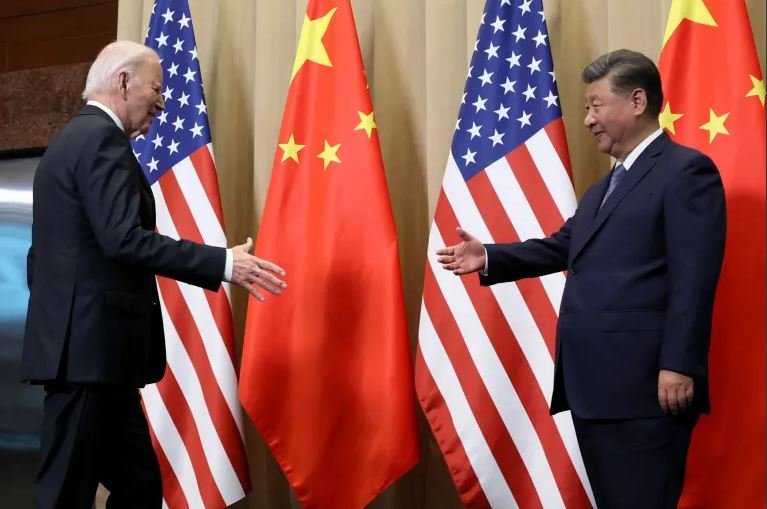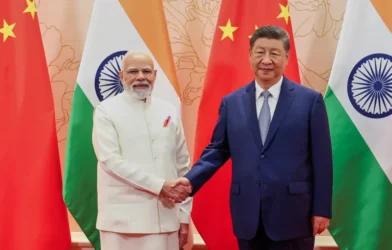Subtotal $0.00

In recent months, Chinese President Xi Jinping has made China's position on the relationship with the United States unequivocally clear, reflected in his speeches and statements at summits such as BRICS, BRICS+, APEC, and the G20.
The Chinese president spoke clearly about his strategy toward the United States in light of President-elect Donald Trump's return to power and the challenges this may bring to bilateral relations, outlining his vision of an idealized world free of Western hegemony that Beijing sees as hindering global progress.
The Chinese president has identified red lines in the relationship that cannot be crossed, including the Taiwan issue, human rights and China's development path.
Perhaps the most notable announcement of these lines and the shape of the relationship came in a meeting with US President Joe Biden on November 16 on the sidelines of the 31st APEC Economic Leaders Meeting in the Peruvian capital Lima.
He emphasized that the policy of "containing China" This meeting may be seen in the future as a watershed moment in Sino-US relations, given its importance, as it set a clear framework for the relationship between the two countries, especially with the return of Donald Trump to power.
Thucydides trap
In his conversation with President Biden at their meeting in Lima, President Xi set out to refute the "Thucydides Trap" theory popular among U.S. politicians today.
The theory is that a clash is almost inevitable between China as a rising power and the United States as a hegemonic power, emphasizing that China cannot be defeated, that those who try to do so will fail, and that its loss will be a loss for everyone.
"An ancient Chinese sage observed that a virtuous man, while working to establish himself and achieve success, also works to help others establish themselves and achieve success," Xi said at the Asia-Pacific Economic Cooperation forum.
During the meeting with Biden, the Chinese president explicitly stated that the policy of "containing China" is not a wise or acceptable option, and is certain to fail.
In his speech, he outlined seven key points as guiding principles for the relationship:
Confrontation between the two sides is not inevitable.
Trust, credibility, and the alignment of words and deeds are prerequisites for a successful relationship.
The need to deal in terms of fairness and competition.
Be careful not to infringe on major national interests, which are considered red lines.
Adopt the principle of dialog and cooperation.
And work to respond to the people's aspirations for stability and well-being.
Recognize the responsibility of major states for world peace and the common good of mankind.
He also emphasized four main red lines in the relationship between the two countries:
Taiwan issue.
Human rights file.
China's trajectory.
China's right to development.
Of course, the addressee of these policies and red lines in the words of the extraordinary Chinese president and other Chinese officials was not President Biden, but Trump, who is known for his hawkish attitudes toward China.
In a Bloomberg article titled "Xi's olive branch to Trump comes with a warning about red lines" and a South China Morning Post editorial titled "Xi sets red lines in talks with Biden for Trump".
During his election campaign, Trump threatened to re-impose tariffs of up to 60% on Chinese imports on top of existing tariffs, and later threatened to impose 100% tariffs on BRICS countries that might consider undermining the US dollar, and to continue pressure policies to limit their rise on the international stage.
He put together a team of anti-China rhetoricians, such as Peter Navarro and Stephen Miller, who have long emphasized in their articles the need to continue pressure plans on China, focusing on "tough dealing," imposing new tariffs and expanding measures to protect U.S. industry.
So, it is clear that Xi wanted to define what is forbidden and allowed in the Sino-US relationship and the various areas of cooperation and try to mutually benefit from interests instead of conflicts, and that China is ready for all options.
However, the official US statement after the meeting reflected a clear disregard for China's firm stance, describing the meeting as "positive and constructive" and talking about a semi-routine meeting that does not constitute a milestone in the relationship between the two parties, indicating US indifference to China's demands or the Biden administration's lack of seriousness in dealing with this important issue, Biden said during his meeting with Xi at the Lima summit.
Kazan summit
Less than a month earlier, the Chinese president delivered a powerful speech at the BRICS summit and then at the BRICS+ summit held in Kazan on October 23 and 24, in which he laid out new visions for the future of the world order, focusing on building a more just and equitable world and the need to prevent the world from slipping into chaos and turmoil.
He sent clear messages about China's desire to lead the transition towards a multipolar world order, away from Western hegemony, which was also reflected in Russian President Vladimir Putin's speech at the same conference, albeit with a less expansive vision than China's.
In his speech to the BRICS+ meeting, which lasted only a few minutes, President Xi used the term "Global South" 13 times, noting the importance of developing countries in shaping the global future, and that their modernization and economic development is a historic event that must be supported.
He also called for strengthening global governance in the areas of security and economics in a veiled reference to the failure of the world order as it is currently constituted, and explicitly rejected hegemonic policies that he described as impeding international cooperation.
The speech also made it clear that Beijing sees a greater opportunity to lead the developing world toward a more sustainable future, at a time when the traditional Western system is experiencing multiple crises.
This focus on the idea of the Global South suggests that China aims to mobilize countries affected by the current international system - most of which are outside the geography of Western Europe and North America - to form a counterbalance to Western hegemony over the world and limit its encroachment, under attractive titles such as development and stability.
China's vision of world order
China's vision was not limited to criticizing the current international system, expressing its dissatisfaction with how the so-called international community is managed, and questioning how these institutions are used to serve specific countries, but it went beyond that to propose multiple initiatives that seek to reformulate this system to serve the global balance of power and solve the intractable crises facing the world.
Beijing believes that gradual reform of the international system will not be sufficient to meet the aspirations of developing peoples, prompting it to market its model as an alternative. A study by the Atlantic Council entitled "How is Beijing Reshaping the World Order?" shows that Chinese initiatives aim to consolidate a new world order with China at its center.
These include the Collective Security Initiative, the Global Development Initiative, the Belt and Road Initiative, the Global Civilization Initiative, and others, and how they are marketed as weaving a new world by Chinese standards and producing a new world order to replace the current one, with the United States at its center.
According to an Atlantic Council study titled "How Beijing's New Initiatives Seek to Remake the World Order," China is promoting a theory in which it is at the center of this future world order.
From the Chinese point of view, China has lifted 800 million citizens out of poverty and has the solutions to all the problems the world is suffering from today, as President Xi expressed in his speech to the Asia-Pacific Economic Cooperation forum when he said that his country has developed systematic plans to deepen reform on a large scale to promote China's modernization.
More than 300 subsequent reform measures have been unveiled related to "building a high-standard socialist market economy, promoting high-quality economic development, promoting high-standard openness, improving people's quality of life, and building a beautiful country," he said. China's further development will bring new opportunities to the Asia-Pacific region and the world."
Of course, the United States does not seem comfortable with these many initiatives. It sees them as undermining its leadership and dominance in the world, and even more than that, it fears that Chinese companies participating in these initiatives, especially the Belt and Road Initiative, will be the center of the system that China is calling for, and that these companies will dominate global markets in America, Africa, Latin America, and even Europe.
Prepare for all eventualities
China is concerned about U.S. policies, especially as Washington theorizes that a clash between rising and hegemonic powers is inevitable, while Beijing pursues a long-term strategy aimed at avoiding conflict by strengthening its global role.
The red lines emphasized by President Xi are the major entry points for undermining Chinese sovereignty.
Beijing has come to realize that its desire to avoid conflict with the United States depends not only on Chinese intentions, but also on the behavior of the United States, which embraces the theory of confrontation and pursues the so-called "small yard, high fence" strategy devised by National Security Advisor Jake Sullivan to limit China's influence.
This approach is not limited to the Biden administration and the Democratic Party, but extends to the majority of the American political elite, which has come to view China as a threat to its leadership over the world and to Western civilization itself.
It must prevent China from achieving its goals at all costs, preferably as soon as possible and before it is too late.
On the other hand, the Chinese elite's attempt to avoid confrontation with America is based on the theory that the United States is a declining superpower and that delaying conflict with it could negate the need for it, as the American role continues to decline and the influence of the West in general weakens.
However, it wants to take sufficient measures to immunize China against defeat in the event of a confrontation in any area with the United States, especially under President Trump, who has been known to employ an unpredictable "madman" strategy in his management of foreign relations.






